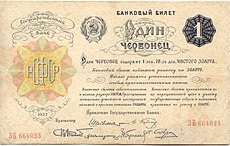1. Russian Currency
 |
| "1976 remint of a 1923 Soviet Russian golden chervonets" --image & words from wikipedia |
Specifically, the chervónets. I had first encountered this Soviet currency while reading The Master and Margarita**, but since it was so obviously a form of currency, there wasn't much point in my looking up a more technical definition. Boy, was I wrong! The chervónets has a very interesting history. The name, itself, dates back to the early 1700s, but the use I have in mind came about during the Russian Civil War in 1922, when the currency was devised to "eliminate debt through systematic devaluation of the rouble and its associated currencies"(quote via wikipedia). It survived until 1947. For ten years, it had Lenin's face on it. But, and this is one of my favorite bits, the plural form of chervónets is chervontsy. Don't ask me why I love it, but I totally love it.
2. Speaking of stories taking place in Russia...
...there is only the teensy-weensiest sweet spot (as far as I can gather, because, let's face it, I am not an expert on international travel between WWI-WWII) that would allow a character from England to travel to Russia pretty much for the hell of it. T'was a touchy political time, and I don't really have the brainpower to come up with hyper-complicated logistics. Essentially, there is a period of time (and, please, guide me in the right direction if you know me to be off track, here. I like to be factual) between 1923 and 1925/26, post WWI, pre-Stalin-being-a-dictator. Slim little window. I'll admit, if I were of an Orwellian-bent in this time period (and a man. Or a very sneaky woman good at disguising herself and maybe also at fighting), visiting Lenin's Soviet Union would be very interesting. I still give good ol' George Orwell endless credit for signing up to fight the Fascists in Spain. You have to either be insanely passionate or insanely aimless to fight in a war for a country you have no familial ties to. But here I am, getting derailed. Just do yourself a favor and read Homage to Catalonia; it's Orwell at his most genuine.
3. Tea!
Still stuck on Russia, but tangenting off a bit, the Russian word for tea? Chai! How easy to remember! The Polish word for tea, herbata, is probably the strangest. The Irish word for tea? Tae. You should check the Wikipedia page for tea in your spare time--there are two roots for the word "tea", both Chinese, that stem from the two different pronunciations (tê = Hokkien, chá = Cantonese) and every other language's word for tea comes from one of those two.***
4. Now that we're on the subject of speaking Irish,
I have always been aware that there is some debate about the root of my name--I've seen definitions ranging from "church" to "small, dark, and war-like", and I had no idea why the heck people couldn't figure it out. So I dug around a bit and I found the two Irish Gaelic roots that my name possibly came from: Cillín and Ceallach. "Ceallach" has the definition attributed to "Killian" that I have encountered most often: war-like, "bright-headed". However, "Cillín" seems more obvious, when one takes spelling and pronunciation into account. That being said, I have no idea why people would have started naming their children Cillín after discovering the long-winded definition (hint: "church" is not the whole picture):
A cillín (Irish: meaning "little church or burial ground"; plural cillíní), was a historical unconsecrated burial place in Ireland for childrenunbaptised at the time of death.[1] Suicides, shipwrecked sailors, strangers, urepentant murderers and their victims were also sometimes buried there—they were used for "infants and other ambiguous categories of individual".[2] Some of them are more than 1,000 years old. Ancient pagan burial practices were sometimes later co-opted by Christianity.[2]
I would like to mention, however, that I think this is the coolest thing to be (potentially) named for, because it is THE MOST HARDCORE-AND-SIMULTANEOUSLY-TRAGIC THING I HAVE EVER HEARD. It fits with my interests pretty well. Though, really, Ceallach ain't bad, either. Moral of the story: perhaps there are a lot of slightly-morbid Irish parents out there. Or, you know, it sounded good.
Hope you enjoyed learning some sweet stuff with me today!
fin.
*I can't actually be productive in coffee shops. Too many people talking, and I can't turn off the part of my brain that drops hella eaves.
**AMAZING BOOK. READ IT.
***Ok, there may be exceptions, but I don't have time to cross-reference every language with the wikipedia list to verify. I admit this is a bit of a generalization, so please consider it as such!